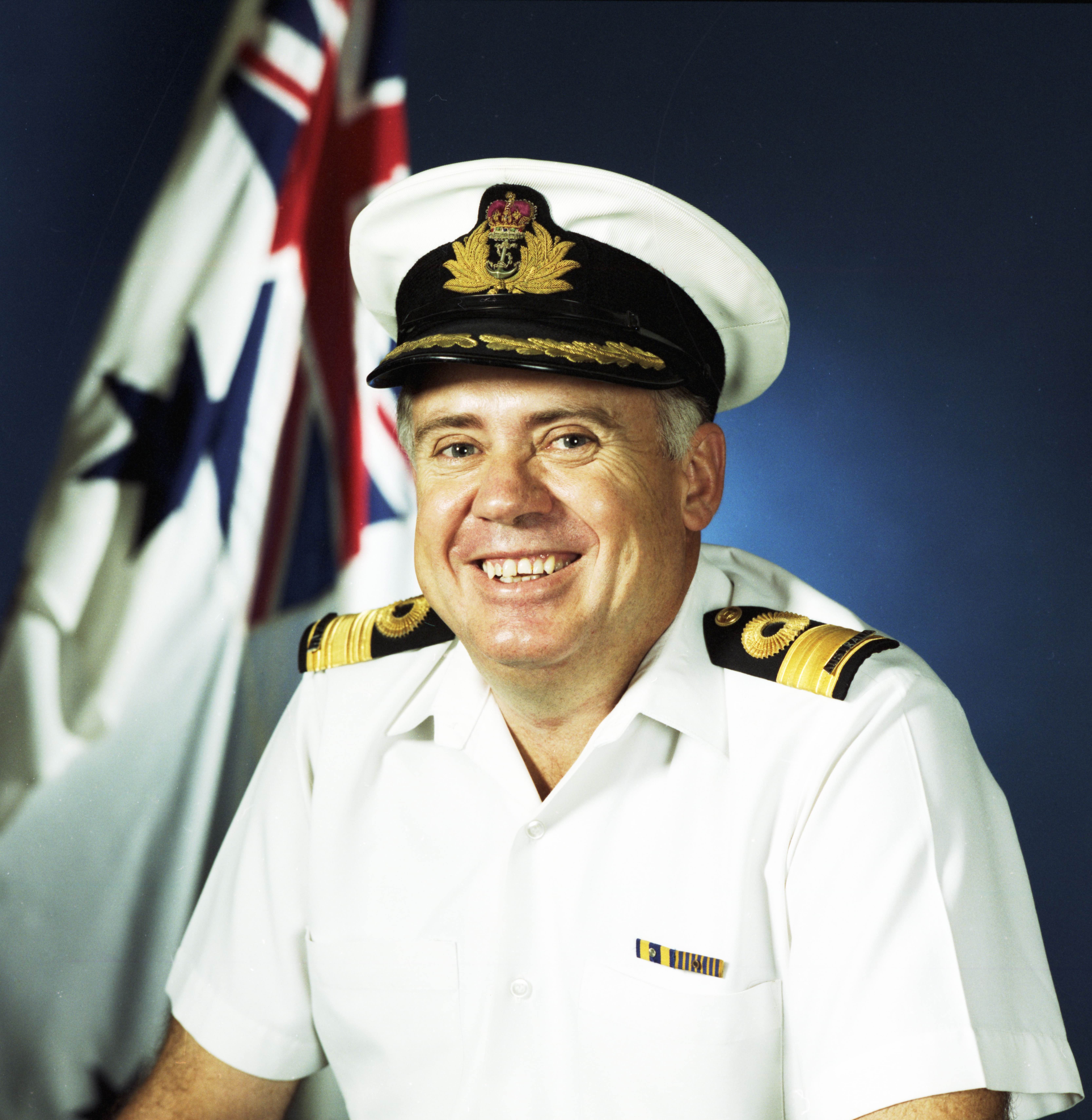Commodore Sam Bateman AM

Walter Samuel Grono (Sam) Bateman (1938–2020) was born in Cottesloe, Western Australia, on 4 May 1938. His father, Walter Martin Bateman, was a shipping agent for Macdonald, Hamilton & Co in Perth, now part of the Inchcape group of companies. His maternal great-great-great grandfather, John Grono, came to Australia from Wales in 1799 as a boatswain’s mate aboard HMS Buffalo and became a prominent ship builder, sealer and whaler in New South Wales.
He regularly visited merchant ships in Fremantle with his father, and one of his earliest naval memories was of visiting the King George V Class battleship HMS Anson, when she was opened to visitors in late 1945 or early 1946. Walter Senior’s work later took him to Adelaide, where Sam befriended two other future naval officers, Chris Hall and Ivan Shearer, and then to Brisbane, where Sam completed his schooling.
He entered the Royal Australian Naval College at Flinders Naval Depot in January 1954 as a 15-year-old cadet. Following graduation, he joined the cadet training ship HMAS Swan in 1956 before travelling to the United Kingdom that September for training at the Britannia Royal Naval College in Dartmouth, where he was promoted to acting sub lieutenant. He graduated in December 1957, returning to Australia the following January. He gained his bridge watchkeeping certificate in the aircraft carrier HMAS Melbourne (II), and participated in SEATO exercises in the South China Sea.
From the largest ship in the fleet, he proceeded to one of the smallest, serving as executiveofficer aboard the tug HMAS Emu. He was promoted to lieutenant in December 1959, and joined the armament stores carrier HMAS Woomera as executive officer in January 1960. On 11 October 1960, an explosion on board started a fierce fire in Woomera’s hold, and the ship sank some 90 minutes later, claiming the lives of 2 crew members. Sam Bateman, along with the ship’s commanding officer, Doug Marshall, faced a court martial after the fire but were cleared of any blame and found to have no case to answer.
Sam Bateman served ashore in HMAS Penguin and again at sea in HMAS Parramatta (III) before assuming his first command, the general purpose vessel HMAS Bass, in January 1963.
He was appointed officer-in-charge of the Marine Section at HMAS Creswell in January 1965 and, in November 1967, was the commissioning commanding officer of the Attack-class patrol boat HMAS Aitape, which formed part of the Papua New Guinea Patrol Boat Group. He was promoted to lieutenant commander the following month. Under his command, Aitape, along with HMAS Ladava, set an RAN navigation record when they ventured some 230 miles inland up the Sepik River in February 1969.
He gained an economics degree in 1970, before being posted once again to HMAS Parramatta (III) as executive officer, during which time he deployed to south-east Asia, escorting HMAS Sydney (III) to Vung Tau during the Vietnam War. He returned to Papua New Guinea in December 1971 as the naval officer-in-charge, Port Moresby, and, later, as the director of Maritime Operations leading up to Papua New Guinean independence.
He was promoted to commander in December 1972.
He returned to Australia in January 1975 as the seaman officer’s career manager in the Directorate of Naval Officers Postings in Canberra. He later assumed command of HMAS Yarra (III) in December 1977, and was heavily involved in Mulloka sonar trials. In 1979, he was posted as the staff officer for force structure planning in the Directorate of Naval Plans. He was promoted to captain in June 1980 and, soon after, appointed as the director of Naval Force Development.
He then conducted a study of the economic significance of seaborne trade to Australia in the Department of Economics at Duntroon, before being posted to the Strategic and International Policy Division, where he was involved in the finalisation of the United Nations Convention of the Law of the Sea (UNCLOS). The experience stirred his interest in maritime law. In his spare time, he began working with the Australian Centre for Maritime Studies, and was involved in a study on marine science technology, initiated by the then minister for Science and Technology Barry Jones, which led to the production of the Oceans of Wealth report.
He returned to sea in December 1984 as the commanding officer of HMAS Hobart (II), which included a deployment to the west coasts of Canada and the United States. He returned to Canberra in May 1986, where he formed part of a team which conducted a review of Australian Defence Force administration for the Vice Chief of the Defence Force.
He was promoted to commodore in June 1986, and went on to hold the posts of Director General Military Staff, Director General Force Development and Director General Maritime Studies Program, which led to the establishment of the Sea Power Centre - Australia.
He was made a Member of the Order of Australia in June 1993 for his service to the Navy, and in particular as director general of the Maritime Studies Program.
He retired from the Navy in December 1993 after 40 years of service.
From 1994 to 1999 he held the position of Director of the Centre for Maritime Policy (now the Australian National Centre for Ocean Resources and Security – ANCORS) at the University of Wollongong, and was also a member of the Ministerial Advisory Group on Oceans Policy and the National Oceans Advisory Group in the late 1990s. He remained active in the maritime policy sphere after gaining his PhD from the University of New South Wales in 2000, and took on a short-term position teaching at the Institute of Defense and Strategic Studies at the Nanyang Technological University in Singapore in 2004. He later returned to the University of Wollongong as a professorial research fellow at ANCORS.
Sam Bateman passed away on 18 October 2020, aged 82.


